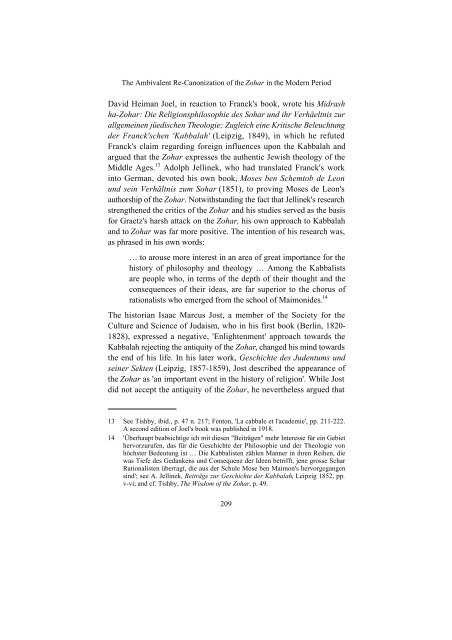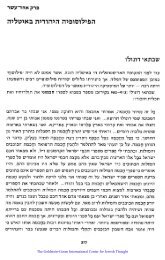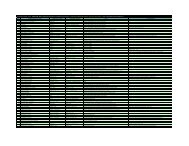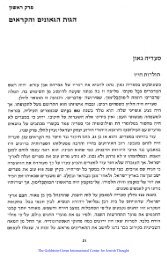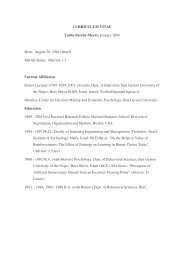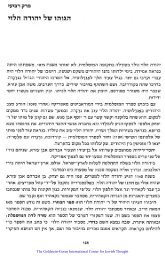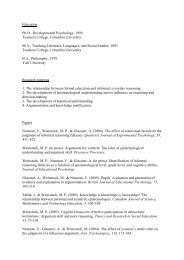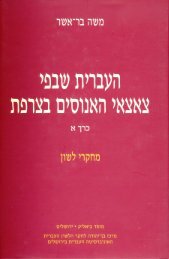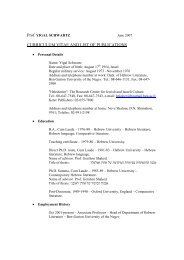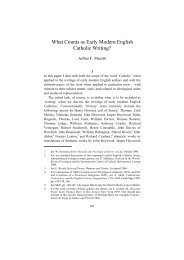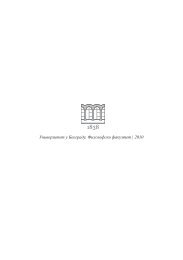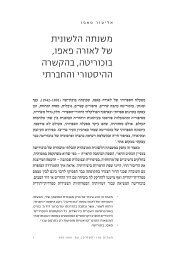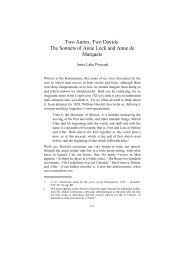Admiration and Disgust: The Ambivalent Re-Canonization of the ...
Admiration and Disgust: The Ambivalent Re-Canonization of the ...
Admiration and Disgust: The Ambivalent Re-Canonization of the ...
You also want an ePaper? Increase the reach of your titles
YUMPU automatically turns print PDFs into web optimized ePapers that Google loves.
<strong>The</strong> <strong>Ambivalent</strong> <strong>Re</strong>-<strong>Canonization</strong> <strong>of</strong> <strong>the</strong> Zohar in <strong>the</strong> Modern Period<br />
David Heiman Joel, in reaction to Franck's book, wrote his Midrash<br />
ha-Zohar: Die <strong>Re</strong>ligionsphilosophie des Sohar und ihr Verhäeltnis zur<br />
allgemeinen jüedischen <strong>The</strong>ologie; Zugleich eine Kritische Beleuchtung<br />
der Franck'schen 'Kabbalah' (Leipzig, 1849), in which he refuted<br />
Franck's claim regarding foreign influences upon <strong>the</strong> Kabbalah <strong>and</strong><br />
argued that <strong>the</strong> Zohar expresses <strong>the</strong> au<strong>the</strong>ntic Jewish <strong>the</strong>ology <strong>of</strong> <strong>the</strong><br />
Middle Ages. 13 Adolph Jellinek, who had translated Franck's work<br />
into German, devoted his own book, Moses ben Schemtob de Leon<br />
und sein Verhältnis zum Sohar (1851), to proving Moses de Leon's<br />
authorship <strong>of</strong> <strong>the</strong> Zohar. Notwithst<strong>and</strong>ing <strong>the</strong> fact that Jellinek's research<br />
streng<strong>the</strong>ned <strong>the</strong> critics <strong>of</strong> <strong>the</strong> Zohar <strong>and</strong> his studies served as <strong>the</strong> basis<br />
for Graetz's harsh attack on <strong>the</strong> Zohar, his own approach to Kabbalah<br />
<strong>and</strong> to Zohar was far more positive. <strong>The</strong> intention <strong>of</strong> his research was,<br />
as phrased in his own words:<br />
… to arouse more interest in an area <strong>of</strong> great importance for <strong>the</strong><br />
history <strong>of</strong> philosophy <strong>and</strong> <strong>the</strong>ology … Among <strong>the</strong> Kabbalists<br />
are people who, in terms <strong>of</strong> <strong>the</strong> depth <strong>of</strong> <strong>the</strong>ir thought <strong>and</strong> <strong>the</strong><br />
consequences <strong>of</strong> <strong>the</strong>ir ideas, are far superior to <strong>the</strong> chorus <strong>of</strong><br />
rationalists who emerged from <strong>the</strong> school <strong>of</strong> Maimonides. 14<br />
<strong>The</strong> historian Isaac Marcus Jost, a member <strong>of</strong> <strong>the</strong> Society for <strong>the</strong><br />
Culture <strong>and</strong> Science <strong>of</strong> Judaism, who in his first book (Berlin, 1820-<br />
1828), expressed a negative, 'Enlightenment' approach towards <strong>the</strong><br />
Kabbalah rejecting <strong>the</strong> antiquity <strong>of</strong> <strong>the</strong> Zohar, changed his mind towards<br />
<strong>the</strong> end <strong>of</strong> his life. In his later work, Geschichte des Judentums und<br />
seiner Sekten (Leipzig, 1857-1859), Jost described <strong>the</strong> appearance <strong>of</strong><br />
<strong>the</strong> Zohar as 'an important event in <strong>the</strong> history <strong>of</strong> religion'. While Jost<br />
did not accept <strong>the</strong> antiquity <strong>of</strong> <strong>the</strong> Zohar, he never<strong>the</strong>less argued that<br />
13 See Tishby, ibid., p. 47 n. 217; Fenton, 'La cabbale et l'academie', pp. 211-222.<br />
A second edition <strong>of</strong> Joel's book was published in 1918.<br />
14 'Überhaupt beabsichtige ich mit diesen "Beiträgen" mehr Interesse für ein Gebiet<br />
hervorzurufen, das für die Geschichte der Philosophie und der <strong>The</strong>ologie von<br />
höchster Bedeutung ist … Die Kabbalisten zählen Manner in ihren <strong>Re</strong>ihen, die<br />
was Tiefe des Gedankens und Consequenz der Ideen betrifft, jene grosse Schar<br />
Rationalisten überragt, die aus der Schule Mose ben Maimon's hervorgegangen<br />
sind'; see A. Jellinek, Beiträge zur Geschichte der Kabbalah, Leipzig 1852, pp.<br />
v-vi; <strong>and</strong> cf. Tishby, <strong>The</strong> Wisdom <strong>of</strong> <strong>the</strong> Zohar, p. 49.<br />
209


